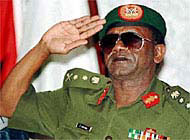Geneva’s Abacha probe enters new phase

Geneva's judicial authorities have confirmed that they are preparing to question a large number of bankers and lawyers as part of their investigation into the SFr1 billion deposited in Switzerland by the former Nigerian military dictator, Sani Abacha and his associates.
Geneva’s chief prosecutor, Bernard Bertossa, told swissinfo he expected more charges to be brought in Switzerland in connection with the Abacha affair. So far, five people have been convicted.
Monday’s edition of the French-language newspaper Le Temps said around 60 bankers, lawyers and fund managers would be questioned in the coming months. Bertossa said it was impossible to give an exact figure, although he acknowledged there were “many” people with whom his department wanted to talk.
“The majority [of them] work for banks which accepted money from the Abacha family. But there are also some lawyers who helped to hide this money,” the prosecutor explained. Bertossa said this represented the next phase of the criminal investigation launched in 1999 after the Nigerian authorities asked for Swiss help in recovering money looted by the Abacha clan.
Having traced and frozen the assets and determined whether they were of criminal origin, Bertossa said “the next step is for us to ask the financial intermediaries who helped to hide the Abacha money to explain how and why they accepted those assets.”
“We want to establish whether money laundering has been committed by financial intermediaries in Switzerland,” he added. Asked if he thought the questioning could lead to new charges, Bertossa replied: “Certainly.”
“There are a certain number of people in Switzerland who agreed to help hide Abacha’s money, and at that time they must have known it was of illegal origin,” he said. He refused to identify those he suspected.
Alleged money trail
In its Monday edition, Le Temps describes how SFr 340 million of illegal Abacha funds allegedly found its way into the Swiss banking system. Abacha’s son, Mohammad, and his associate Abubakar Bagudu, obtained the money through the repurchase of debts, the newspaper said. According to the article, the debts were owed by Nigeria to Russia for the construction of a massive iron and steel plant. Ajaokouta factory reportedly never produced anything, the newspaper report said.
It claimed that, after Merrill Lynch refused to touch the money, another bank, the Zurich branch of Goldman Sachs, accepted it, but then transferred it in September 1997 to the Geneva branch of Barings Brothers. The paper said Barings knew the money was linked to the Abacha regime, but agreed to take it following glowing references from other banks and companies. One recommendation from Citibank in London described Mohammad Abacha and Bagudu as “respectable and trustworthy and good for normal banking engagement”.
However, in early 1998, with the new Swiss law on money laundering about to take effect, Barings asked Abacha and Bagudu to take their money elsewhere. The law obliges all firms providing financial services to alert the authorities should suspicious accounts be uncovered.
Bagudu and Abacha junior then recruited the Geneva finance company, HBK, and the legal firm, Schellenberg Wittmer, to help them to find a new home for their money, Le Temps alleges. Schellenberg Wittmer says it only gave the pair legal advice.
Inquiry launched
In June 1998, SFr 234 million of the money was transferred to a branch of the Deutsche Bank in Jersey. The authorities on the Channel island have launched an inquiry to determine if the transfer constituted money laundering.
None of the companies concerned were willing to give a statement about the allegations.
Nevertheless, Bertossa is critical of the role played by the British authorities in trying to clear up the affair.
“We would have expected the British authorities to have been a little more active in prosecuting the case. It’s public knowledge that a lot of money – more than we found in Switzerland – passed through the British financial market,” he told swissinfo.
In a report published last year, the Swiss Federal Banking Commission criticised the “crass errors” made by some Swiss banks, including Credit Suisse, which had accepted 250 million dollars (SFr 430 million) from Abacha’s family.
Le Temps says there were two other instances of banks either failing to make appropriate checks of money originating in Nigeria under Abacha and ignoring warnings that the funds may have come from dubious sources.
The Nigerian government says that after seizing power in 1993 and before his death five years later, Abacha diverted $3 billion (SFr5.13 billion) to foreign bank accounts. It says the general used members of his family, close aides and business associates to dispose of the cash, which was amassed by awarding contracts to front companies, taking huge bribes and by creaming off money directly from the treasury.
Around SFr1 billion ($580 million) is believed to have ended up in Switzerland. Other looted funds were deposited in Luxembourg and Liechtenstein and Jersey.
In 1999, at the request of the Nigerian authorities, Switzerland froze all Abacha assets, which totalled around SFr 1 billion. Of this about SFr 60 million has already been returned to Nigeria.
by Roy Probert

In compliance with the JTI standards
More: SWI swissinfo.ch certified by the Journalism Trust Initiative
You can find an overview of ongoing debates with our journalists here. Please join us!
If you want to start a conversation about a topic raised in this article or want to report factual errors, email us at english@swissinfo.ch.